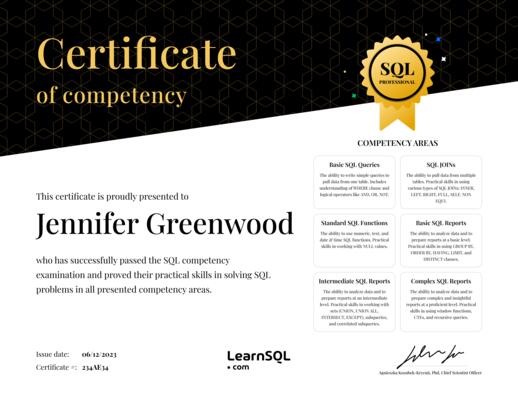Advanced Track
Advanced SQL
Go beyond the basics and become a SQL master. Learn modern SQL features that let you write more complex and effective queries.
4.81
29,922 Lerners enrolled
Free trial Yes
Certificate of completion Yes
Estimated time 45 h
Courses included 3
Skills you will gain
- Understand and apply window functions, which make writing complex queries easy.
- Learn when and how to use different ranking functions (RANK(), DENSE_RANK(), ROW_NUMBER()) to compute ranking reports in SQL.
- Compute running totals and running (cumulative) sums.
- Write complex reports using GROUP BY and CASE WHEN.
- Differentiate and use ROLLUP, CUBE, and GROUPING SETS operations.
- Use Common Table Expressions to organize a long SQL query.
- Create recursive SQL queries to process hierarchical data structures, such as trees and charts.
Last reviews
Description
This learning path is for people who know some SQL and want to learn the language’s more advanced features and latest trends. Scroll down for details.
You want to improve your SQL skills. You already know the basics; now it's time to go to the next level. The Advanced SQL track will teach you the most up-to-date, efficient, and time-saving querying techniques.
Discover Window Functions that enable you to use aggregate functions without collapsing rows. Window functions (also called analytical functions or OVER() functions) let you rank data, compute running totals, and create reports with day-to-day or month-to-month deltas. Common Table Expressions make your code better organized and simpler to read. Recursive Queries allow you to process hierarchical data like trees and graphs using SQL. And advanced GROUP BY clauses like ROLLUP, CUBE, and GROUPING SETS add power and flexibility to your queries.
In other words, the Advanced SQL learning path will help you become a qualified programmer, data analyst, or DBA with fully modern skills.
What's in it for me?
- The only fully interactive advanced SQL learning path on the internet. Three courses bring you the latest on SQL’s advanced features. Learn whenever and wherever you like.
- Learn by doing. Get hands-on practice with our real code editor, real data sets, and real-life problem-solving.
- Online certification. After successfully completing the course, you will receive a certificate that you can publish on your LinkedIn profile.
- 30-day money-back guarantee. If you're not satisfied with this course, tell us within 30 days of purchase and you’ll get a full refund.
- Trusted support system. Every course comes with access to our resource base, student2student support, mentor2student support, and technical support. You can also join our learning community and participate in on-task discussions.
- Hints and more. If you get stuck, you can use the included exercise hints. Or use the Discuss tab to ask questions and share insights with other members of the LearnSQL community. You can also drop us a line at contact@learnsql.com and we'll be more than happy to help!
Objectives:
- Understand and apply window functions, which make writing complex queries easy.
- Learn when and how to use different ranking functions (RANK(), DENSE_RANK(), ROW_NUMBER()) to compute ranking reports in SQL.
- Compute running totals and running (cumulative) sums.
- Write complex reports using GROUP BY and CASE WHEN.
- Differentiate and use ROLLUP, CUBE, and GROUPING SETS operations.
- Use Common Table Expressions to organize a long SQL query.
- Create recursive SQL queries to process hierarchical data structures, such as trees and charts.
Who should take this course track?
- Programmers, DBAs, and analysts who want to keep their knowledge of SQL up to date.
- Programmers who want to expand their knowledge and skills beyond what is usually found in online courses and books.
- Anyone who knows fundamental SQL and wants to learn the language’s advanced features.
Requirements:
- A web browser
- An internet connection
- Basic knowledge of SQL (e.g. you’ve completed our SQL Basics course)

Track courses
-
Window Functions218 Coding challenges Advanced
Learn how to use analytic SQL functions to deeply understand data.
-
GROUP BY Extensions in SQL63 Coding challenges Advanced
Do you want to work more efficiently using SQL and be able to create more complex and sophisticated queries? Learn about GROUP BY clauses, such as ROLLUP, CUBE, and GROUPING SETS.
-
Recursive Queries114 Coding challenges Advanced
Master the most challenging type of SQL queries. Learn how to process trees and graphs in SQL, and how to effectively organize long SQL queries.

Get the Certificate of Competency in SQL
This certificate will confirm your practical SQL problem-solving skills
